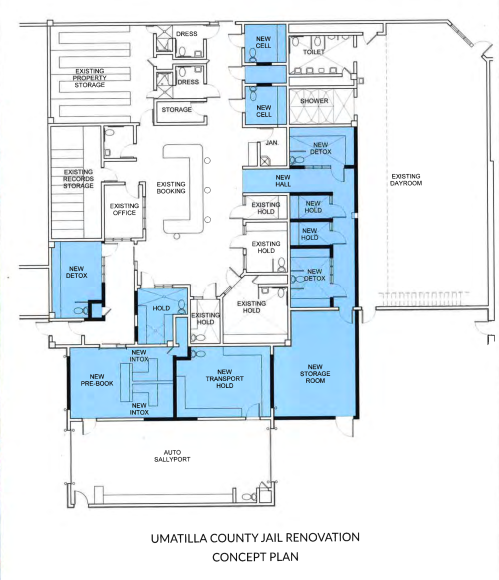County officials push for jail renovations amid concerns for mental health, addiction treatment
Published 5:00 am Saturday, April 24, 2021

- An architectural drawing of the Umatilla County Jail highlights areas proposed for renovation in blue.
PENDLETON — Umatilla County officials are once again pressing for state funding to renovate the Umatilla County Jail amid growing concerns of the jail’s ability to care for people who are arrested while suffering from addiction or mental health crises.
The project, aimed to better accommodate inmates facing medical issues, drug addiction or mental illness, was approved in 2020 to receive about $1.6 million in state funding provided by the sale of lottery bonds. Due to the COVID-19 pandemic, however, lottery revenues “went south,” according to Umatilla County Commissioner George Murdock.
Officials are now seeking more than $2 million in state funding for the project.
“We’re having to go back out and say, ‘Hey, you guys already approved this, approve it again,’” Umatilla County Commissioner John Shafer said. “But the problem is that in two years we’ve seen the price of materials skyrocket.”
The renovations include building new detox, holding and medical cells, as well as cells that would accommodate inmates entering the facility in a transport situation and other upgrades to the jail’s prebooking and intake area.
The renovations would also allow for a variety of social services like mental health and addiction counseling and treatment, officials say.
“I think it’s going to be an incredible asset,” Umatilla County Commissioner Dan Dorran said. “And I think it’s going to leave an extreme void if” the project isn’t completed.
Murdock was set to testify in front of state lawmakers at the Joint Ways and Means Subcommittee on April 17 regarding the jail renovation. The meeting was held remotely, and because of this, neither Murdock nor Shafer were given a chance to testify.
The commissioners submitted written testimonies for the projects meant to be presented, and now, “we’re blowing up the phones of our legislators,” Shafer said, adding the project is now up against others that are vying for state funding, including local projects.
The county has already invested approximately $250,000 into the project, officials say.
“We’re shovel-ready,” Murdock said. “We’ve done all the preliminary work. It should be clear to them that we’re serious and committed.”
Housing those in need
Law enforcement used to drop off arrestees suffering from a mental health crisis or addiction at facilities where they can recover, like the Blue Mountain Recovery Center. Many of these individuals are arrested on low-level offenses like trespassing or criminal mischief, officials say.
But when the facility closed in 2018, the burden of housing and caring for people in crisis shifted to the jail, officials say.
Now, with the closure of the Aspen Springs Psychiatric Hospital in Hermiston, which provided the county and state with sorely needed mental health treatment beds for patients needing acute care, some officials are concerned the jail could see an even greater influx of inmates in crisis.
“We’ve made a criminal out of somebody who is in crisis when they’re not a criminal — they’re just somebody who’s in crisis,” Shafer, who worked for the Umatilla County Sheriff’s Office for 18 years, said. “And now, because of COVID and everything else, we have a lot of people who are in crisis, and we have no place to take them. We don’t have a Blue Mountain Recovery Center or Aspen Springs. Now, we’re relying on this jail.”
This, officials say, places jail staff in a difficult position.
“Law enforcement and corrections deputies don’t have the training or expertise in treating those in crisis,” Umatilla County Sheriff Terry Rowan said. “That’s where the genuine need is.”
Rowan said he would prefer that inmates struggling with mental health or addiction be housed in facilities geared specifically toward treatment.
“We have become a sort of ad hoc mental health facility,” he said. “If I had it my way, we wouldn’t house those individuals. We would find them a local resource where they can be housed and stabilized and where they can get the treatment that they need.”
Building new facilities where inmates with mental health struggles can be separated from those incarcerated for more serious offenses could provide an answer.
“Our mission in the county is to get the sheriff’s office out of mental health,” Murdock said. “We openly don’t feel the sheriff’s office should be playing such a major role in dealing with mental health. And they don’t either because that’s not what they’re trained for.”
Years in progress
Faced with limited resources and the challenges presented by the rural locale, Eastern Oregon law enforcement houses inmates in the jail not only from Umatilla County, but also from Wallowa, Union and Morrow counties, as well as the Confederated Tribes of the Umatilla Indian Reservation, according to officials.
The jail also serves as a “transfer hub for many other correction facilities in several western states,” according to Murdock.
This is partly why the jail population has increased over time, officials say. In its early years, the jail’s average daily population was just 135 inmates. Today, that number has increased to more than 230 per day, making renovations crucial, officials said.
“Some of the infrastructure that was assumed back at that lower population doesn’t meet the needs of the future,” Rowan said.
Murdock said the “expanded utilization” of the jail has compromised its ability to maintain safe and secure facilities, noting the jail was “designed to handle far less prisoners than the current load.”
“In the end, the biggest overriding reason for the renovation of the jail is to deal with the fact that it isn’t able to accommodate the number of inmates we’re keeping there,” Murdock said.
This makes it even more important to keep inmates struggling with mental health or addiction separated from other groups, officials say.
“It’s for their own safety,” Rowan said. “Because the behaviors they display are unfavorable to others. So if they start acting out, then it could upset the other people housed with that individual. It’s a matter of safety for them to reduce the risk of anything like a fight breaking out or something like that.”
Rowan said he’s optimistic that the funding will come this time around.
“I’m very hopeful,” he said. “We’re ready to go. We have bid-ready documents that we can send out once funding is secure. Then we’ll have a better timeline on when we can start and finish the project.”
Murdock noted that lawmakers have long been, and remain, invested in supporting the project.
“We’ve been working on this for a long time,” Murdock said. “Just when you think you’re there, you aren’t. But I think there are a number of key people in Salem in the Senate and the House who are very supportive of our program, understand it, and it will, I hope, prevail.”









